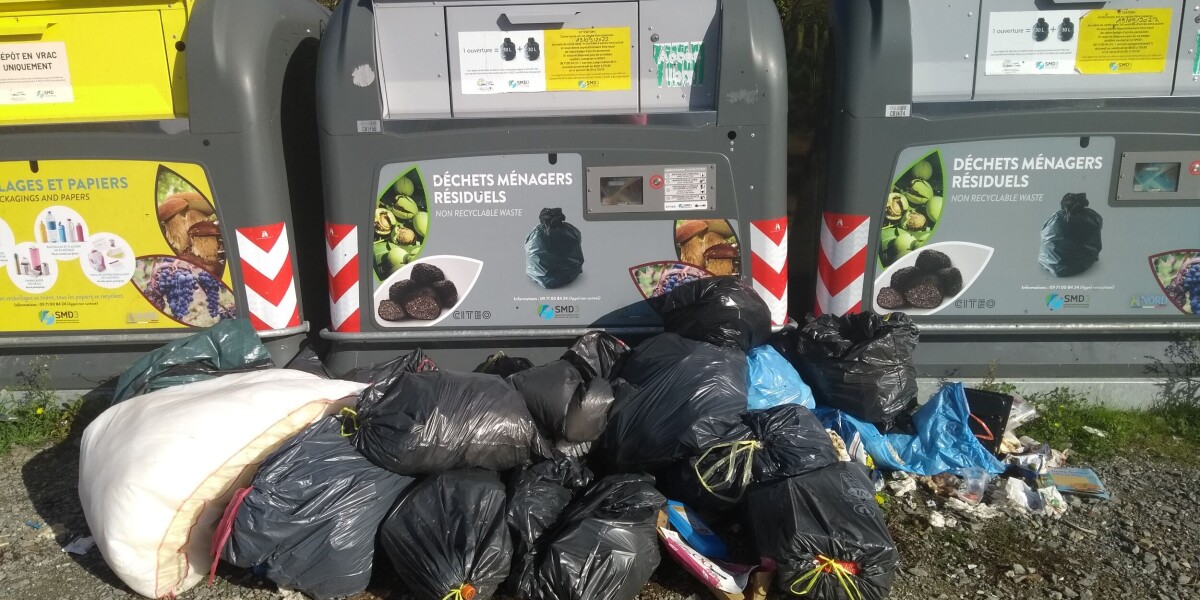
Maggots, protests: dordogne reacts to ‘pay-as-you-throw’ waste system
- Select a language for the TTS:
- UK English Female
- UK English Male
- US English Female
- US English Male
- Australian Female
- Australian Male
- Language selected: (auto detect) - EN
Play all audios:

PARTS OF SOUTH WEST FRANCE ARE UNDER A NEW WASTE MANAGEMENT REGIME ALLOWING A FIXED NUMBER OF VISITS TO COLLECTIVE BINS PER YEAR, WITH CHARGES FOR EXCEEDING THAT LIMIT After a trial period
and several delays, parts of Dordogne in south west France are now subject to a new waste management scheme which aims to encourage people to throw away less. It allocates households a set
quota of visits to collective bins for a fixed sum and then charges more for extra visits. When SMD3, the firm running the service, announced the rates in November, they were significantly
higher than it had estimated earlier in the year. For a household of two, like mine, the annual subscription has risen from €178 to €244.70, a 37.4% increase. SMD3 blames the rise on the
higher cost of fuel and electricity. Previously, our waste bill was paid as part of our _taxe foncière_, based on the theoretical rental value of the property. For a two-bedroom house the
rate was around €90 per year. The new so-called _redevance incitative_ (‘incentive fee’) is designed to halve non-recyclable rubbish by 2025 to meet government guidelines. READ MORE: HOW TO
RECYCLE IN FRANCE: SEVEN COMMON QUESTIONS ANSWERED I have been issued a card permitting 26 trips a year to a smart new general waste container where, after swiping, I can hoist a maximum of
two black bags per go inside while simultaneously pushing down a pedal with my foot to keep the lid open. Extra visits will set me back €5.22. Since the new system, I have reduced my general
rubbish to virtually nothing. I am not sure that my total volume of waste has gone down, but it is being redistributed from black to yellow recyclables bags which have free collection. The
success of the scheme relies, of course, on where and how the recyclables are processed. One associated issue is that restricting bin visits means bags sit at home for up to two weeks.
HEAVY, SMELLY AND FULL OF MAGGOTS By then, they are heavy, smelly and full of maggots, particularly in summer. A single person would have only 16 deposits per year to my 26, and even more
maggots. It is no longer possible to dispose of your rubbish unrecorded. Not only do we have to pay for a service, but we get rationed, tracked and penalised for overuse. As we move towards
a society in which surveillance becomes the norm, other services will no doubt follow suit, such as electricity consumption and the introduction of a personal digital carbon footprint. Maybe
such initiatives are the only way to curb consumer excess. Invariably, however, we end up paying more for less, and lose privacy in the process. Do we need such enforcement of ecological
goals? Who is profiting? The effort would feel more genuine if the consumer was left better off for doing their bit – or at least not out of pocket. Households that do not use their full
quota of bin visits can apply for the surplus to be reallocated to people suffering from incontinence who need more regular visits. A door-to-door collection service can be arranged for
disabled residents at an extra cost. In these ways, it appears that the scheme penalises some of the most vulnerable people in society, as well as families with young children using nappies.
Locals are fighting back by dumping their bags outside the containers. Tractors have been engaged in the protest too and one bin near us has been vandalised by disabling the reader or
scanner. so more rubbish can be added. RELATED ARTICLES HOW TO DISPOSE OF OLD FIRE EXTINGUISHERS IN FRANCE FRENCH TOWN COLLECTS STALE BREAD TO MAKE ENERGY AND FERTILISER ‘NEW BINS ONLY MAKE
RECYCLING IN FRANCE MORE DIFFICULT’
